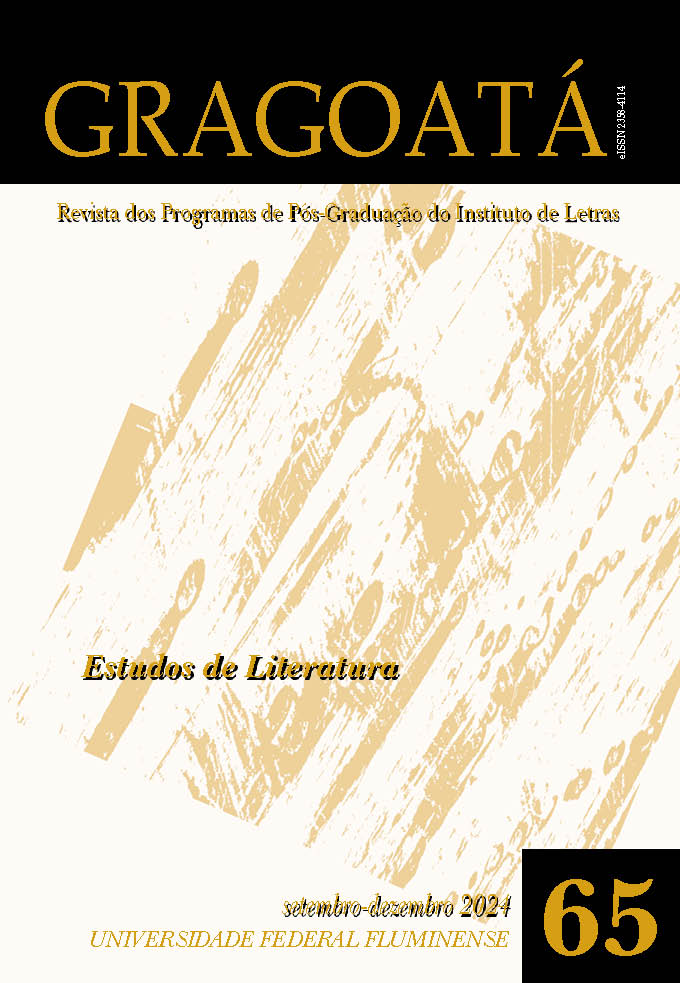Ana of voices
DOI:
https://doi.org/10.22409/gragoata.v29i65.63652.ptKeywords:
Amazonia, literature and art, Andean Cultures and Civilizations, Amazon Valley/Amazon Basin, Western perspective and Latin American discoursesAbstract
To honor the unique person and researcher Ana Pizarro, we chose to do a synchronous reading of her contributions on the Amazon. Their approaches present a familiar and, at the same time, different perspective on the region. The article addresses the topic based on the author’s three motivations for dedicating herself to the region: the lack of knowledge in the Latin Americanism, Chile’s relationship with the Pan-Amazonian region and the issue of ‘our’ utopias and illustrated aesthetics (literature and art). Discourses about the Amazon point to particularities of the Hispanic (Amazon Valley) and the Lusophone (Amazon Basin) vision and always depart from certain situations in historical time and geographical space. The ancient Andean cultures themselves were searching a Paradise, The Golden Land of Peace and given the complex construction of Machu Picchu, we can see that there was a ‘plan’ to penetrate the Amazon. The perspectivation of Ana Pizarro’s approaches keeps the structural and semiotic complexities of historical events alive and she is an important voice in this direction of a new look at the region. Getting rid of a Western perspective means delivering a discourse different from the post-colonial and in line with the current one called ‘decoloniality’.
Downloads
References
ABBOTT, Edward A. Flatland: o Mundo Plano. Tradução de Leonor Bizarro Marques. Porto: Porto Editora 2016 [1884].
ACKERMANN, Tim. “Folge dem Vogel!“ (Segue o pássaro). In: Weltkunst (Impressão especial para a exposição). Zurich 2024.
APPIAH, Kwane Anthony. The Lies that Bind. Rethinking Identity. London: Profil Books 2019 [2018].
BOLLE, Willi. A Travessia Pioneira da Amazônia (Francisco de Orellana, 1541-1542). In: BOLLE, Willi; CASTRO, Edna; VEJMELKA, Marcel (org.), Amazônia. Região Universal e Teatro do Mundo. São Paulo: Globo 2010. p. 19-56.
BOURDIEU, Pierre. Os Usos Sociais da Ciência. Tradução de Denice Barbara Catani. São Paulo: Editora da UNESP, 2003 (1997).
CLINE, Eric H. 1177 B.C. The Year Civilization Collapsed. Princeton; Oxford: Princeton University Press, 2021.
D’ANGELO, Biagio; PEREIRA, Maria Antonieta (org.). Um Río de Palabras. Estudios sobre Literatura y Cultura de la Amazonia. Lima: Fondo Editorial UCSS; Lima: Embajada de Brasil 2007.
FERREIRA DE CASTRO, José Maria. O Instinto Supremo. Amadora: Cavalo de Ferro 2019 [1968].
GONDIM, Neide. A Invenção da Amazônia. Manaus: Valer, 1994.
KLENGEL, Susanne. Die Rückeroberung der Kultur. Lateinamerikanische Intellektuelle und das Europa der Nachkriegsjahre (1945-1952). Würzburg: Königshauser & Neumann 2011.
KUPFER, Eckhard E. Amazônia: do Cacau à Borracha, da Borracha à alte Tecnologia, 2010.
MALIGO, Pedro. Land of Metaphorical Desires. The Representation of Amazonia in Brazilian Literature. New York; Washington: Peter Lang, 1998.
MANN, Charles C. Kolumbus’ Erbe. Wie Menschen, Tiere, Pflanzen die Ozeaneüberqueren und die Welt von heute schufen. Tradução do ingles de Hainer Kober. 2011. Reinbek bei Hamburg: Rowohlt 2013.
MARTELLI, Amália. Amazônia: Nova Dimensão do Brasil. Petrópolis: Vozes 1969.
MARTIUS, Carl Friedrich von. Frey Apollonio ein Roman aus Brasilien. Tradução de Erwin Rosenthal. Berlin: Dietrich Reimer. Verlag, 1992.
MARTIUS, Carl Friedrich von. Frey Apollonio um romance do Brasil. Tradução de Erwin Rosenthal. São Paulo: Brasiliense, 2005.
PIZARRO, Ana. Entrevista com José Leandro Urbina: “Ana Pizarro: La Reina del Amazonas”, 2019. Disponível em: https://www.scielo.cl/scielo.php?script=sci_arttext&pid=S0719-36962019000200215. Acesso em: 18/06/2024.
PIZARRO, Ana. Amazónia. El Río Tiene Voces. Santiago: Fondo de Cultura Económica, 2009.
PIZARRO, Ana. Voces del Seringal: Discursos, Lógicas, Desgarramientos Amazónicso, 2007.
PIZARRO, Ana. Vicente Huidobro. Em Breve. Santiago de Chile: USACH, 2001.
PIZARRO, Ana. El Creacionismo de Vicente Huidobro y sus Origens. In: PIZARRO, Ana. Mapocho, Santiago de Chile, 1969. p. 229-248
POMPA, Cristina. Religião como Tradução. Missionários, Tupi e Tapuia no Brasil Colonial. Bauru: Editora da USC, 2003.
PRESSLER, Gunter K. Yautí. Fábulas do Jabuti da Amazônia. Mitos Indígenas ou o Sujeito subalterno representado? Revista Dobra − Literatura Artes Design, v. 7, p. 01-12, 2021.
PRESSLER, Gunter Karl. Presença/Ausência da Amazônia no Discurso Cultural Brasileiro do Século XX. Inaugural Lecture no Instituto de Estudos Latino Americanos, Freie Universität Berlin, 2013.
PRESSLER, Neusa. Econegócios e Cooperação Internacional: Novos Discursos sobre a Amazônia, 2010.
RIBEIRO, Natália L.; PRESSLER, Gunter K. O que está em Jogo quando Insistimos tanto que a Subalterna fala? Problemas Tradutórios e Epistemológico do Ensaio de Gayatri Spivak no Brasil. In: RIBEIRO, Natália L.; PRESSLER, Gunter K. Via Atlântica. São Paulo, 2022. p. 377-401.
SAGUIER, Rúben Bareiro. Cahiers Du Monde Hispanique et Luso-Brésilien (Caravelle), n. 17, p. 235-237, 1971. Disponível em: https://www.persee.fr/doc/carav_0008-0152_1971_num_17_1_1837_t1_0235_0000_2. Acesso em: 18/06/2024.
SILVA, Ana Maria Vieira. A Viagem Poética de Max Martins: Erotismo, Vida e Morte na Natureza Amazônica, 2007.
SOUZA, Márcio. História da Amazônia. Manaus: Valer, 2009.
UGALDE, Fernanda. Mehr als Gold. Glanz und Weltbild im indigenen Kolumbien (“Mais do que o Ouro. Brillo e Visão do Mundo na Columbia Indígena”). Zürich: Rietberg Museum, 2024. Disponível em: https://rietberg.ch/en/exhibitions/morethangold. Acesso em: 3 de julho de 2024.
VILLENA, Carlos Milla. Ayni. Semiotica Andina de los Espacios Sagrados. Lima: Universidad Particular San Martín de Porres, Faculdad de Ingeniería y Arquitectura, 2003.
WAGLEY, Charles. Amazon Town. A Study of Man in the Tropics. New York: The MacMillian Company, 1953.
Downloads
Published
How to Cite
Issue
Section
License
Copyright (c) 2024 Gragoatá

This work is licensed under a Creative Commons Attribution 4.0 International License.
Authors who publish in Gragoatá agree to the following terms:
The authors retain the rights and give the journal the right to the first publication, simultaneously subject to a Creative Commons license CC-BY-NC 4.0, which allows sharing by third parties with due mention to the author and the first publication by Gragoatá.
Authors may enter into additional and separate contractual arrangements for the non-exclusive distribution of the published version of the work (for example, posting it in an institutional repository or publishing it in a book), with recognition of its initial publication in Gragoatá.

Gragoatá is licensed under a Creative Commons - Attribution-NonCommercial 4.0 International.














